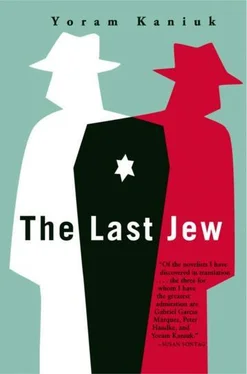He put his hand on his pocket. As if all the treasures of the globe were in his pocket, nobody got up, he stopped smiling. If you don't laugh, said Samuel Lipker, it means that we really have come to Copenhagen. And that's good. Ladies and gentlemen, welcome in total silence the genius, the man who possesses the most knowledge in the world, the memory of all generations, on two feet, millions of words by heart, welcome the Last Jew!
And then Ebenezer, you climbed onto the stage, you wore the clothes in which you welcomed us tonight. You were pale, a hush was cast over the audience, they were waiting for you, and when you appeared, Samuel said: Birthplace-Palestine. Education-six years of grammar school. Loyal remnant of the Third Reich, carpenter, you didn't listen, you stood there, flooded by the spotlight shining on you, you shut your eyes, Samuel whispered a few words and only you heard, you didn't respond, didn't move, stood as if you were praying, stooped over, you looked like a pauper, you'd evoke pity and contempt and then Samuel said in a monotone that may have been a signal to you: Ladies and gentlemen, set your watches three years back, the time is seven twenty a.m., snow is falling, gray, smoke, two cows are electrocuted on the fence, January, a train rumbles. And you were concentrated on one point, stooped over, wretched, like an epileptic, and the audience-that amazed me-set their watches, as if you really could set watches three years back and a few minutes later, time no longer existed, and I say minutes and maybe it was hours, a voice sounded from the audience: Einstein's theory of relativity. I waited, it was possible to hear the dead herring in the onion sauce, and then you recited, you recited quietly, in a monotone, in Polish, and then in Danish, the theory of relativity. When you spoke Polish, Samuel translated, and I knew a little Polish, my father was in charge of propaganda in Poland for a while, and my son, you don't know, committed suicide after the conversation with my father, a conversation my father demanded and I opposed, he demanded that the grandson know and not wonder and after that you were asked to recite other things, the audience knew what to ask, what to request, they knew you, they loved you, maybe they hated you, I don't know, and yet it was so touching, I drank my two glasses of beer, I ate the herring, and you recited Jewish knowledge, Danish was also Jewish knowledge as far as you were concerned, you recited in great detail the annals and strange deaths of Christian saints and the annals of their authentication, you quoted with maximum precision (I checked it later) the love affairs of the popes up to the fourteenth century. Then you recited the annals of the Jews of Spain and the system of counting used at the time of the Talmud, and I listened in despair, I enjoyed and was absurd in my own eyes, excited. You entertained, it was awful, you stood at your own end and you laughed, because you knew things that shouldn't be known, that nobody can or should know by heart. You were an acrobat of words, annals, history, and the audience loved you, loved the disgust and the entertainment, they were tired, it was after the war, hunger reigned, you amused them, they drank their beer, ate the herring and the shreds of cheese, and listened.
Henkin the teacher, thinks Teacher Henkin, is sitting in a house that is both familiar and unfamiliar, he is looking at the subject of his investigation and his ears are surely burning, Hasha Masha looks at him, does she feel compassion? Henkin investigated the history of the Falashas. The story of Joseph de la Rayna, Masada and Yavneh. Survival versus the fever of revolt, wrote about the greatest heroic speech written in the history of Judaism, the patriotic speech every Israeli student learns by heart, the speech of Eleazar ben Yair about Masada, written by Josephus Flavius, that is, Yohanan the Traitor who commanded the siege of Yodfat, sur rendered, joined the Romans and wrote the history of their war against the Jews and with his own hands wrote the speech of great hope, the dying speech of Eleazar ben Yair. Only if you steal the victory from the Romans will you be remembered and that's how the Jewish memory was born, and the Last Jew is its last product, or perhaps not the last…
Some time ago I read in the paper that they were seeking soldiers at a salary of two hundred pounds a day for the Roman army. They were making a movie about the Masada revolt. And they really did set their watches back. In the Land of Israel, written time didn't exist then, Henkin, Hebrew time has its own logic. That attempt of mine to write about Ebenezer is my last attempt. And now it was stolen from me, too, a good writer doesn't have to be a commander of a bad camp.
I look at the big cabinet to the left of Ebenezer. Three squares constitute the center of each door of the cabinet. Made of veneer, so many shades of brown and beige and yellow and black that isn't exactly black but isn't brown either, woven into one another, etched with wonderful acrobats, winding and cunning, lacquer backgrounds, delicate work of stripes and slats, some intelligent musicality, for with his own hands Ebenezer had built that cabinet just as he had built the grandfather clock, and all the other furniture of the house, and had even carved the birds.
Who would have wasted days and nights to bring the wood to such a charming and complex decadence, to rinse the lacquer to lechery like some artificial rain, like a sweet psalm to wood, subdue the tones to a marvelous harmony, and he stands here before me, the father of Boaz who destroyed my life and recites not to me, not to his great investigator, but to a German who tossed into the fire the last of the blacksmiths, the last of the carpenters, the last of the great artists, the last of the kings where a single violin played on the millions of their graves, Jewish entertainers in Warsaw, the electricians, the physicians, the great adulterers, that sadness that was thrown into the fire, two-fifths of an American cent, I look at the cabinet, who will still build such cabinets? You, Ebenezer? The world that wanted you to disappear comes to applaud you in nightclubs… And soon it's morning, they drink tasty, cold borscht, with a little sour cream, chilly, a pleasant wind blows from the sea, and the German says, Henkin brought me, he doesn't even know who you are!
I knew and I didn't know, I stammered pensively.
He knew and didn't know, said my wife with a laugh that was not devoid of warmth.
And Boaz, said my neighbor.
A fine dog, said my wife, a purebred, green and gold eyes, charm and devilishness.
A purebred, said my wife, son of a father who fled from him to be a Last Jew, took a great lust to kill a Jew, took Noga and Menahem Henkin, and Obadiah, my dear doesn't understand, the love that was suddenly kindled in her.
Renate got up and gave Hasha Masha a cookie. Hasha Masha gnawed on the cookie from Renate's hand. The German was silent, took a pack of papers out of his pocket and leafed through it, then he said: These are letters you wrote me, Ebenezer, and Ebenezer scanned the letters in the glow of the neon light and my wife fell asleep or perhaps only shut her eyes with a cookie in her mouth. Renate stroked my wife's head and started conducting an invisible chorus as if we were now to hear the singing of dead angels.
That was an awful night, said the writer. Three hours you spoke, in the Blue Lizards Club. You hypnotized yourself, and then I heard the melody, the rhythm. You prayed a distant prayer I didn't know. Then we talked. You knew exactly who I was. Then I didn't yet understand that you didn't have what the experts call "self-consciousness" and I didn't know you were a man without a history. For hours I interrogated you in the small hotel where you and Samuel were staying. I paid Samuel two marks for every half hour. He sat with a watch in his hand, and every half hour he asked me for money, and I paid, even for one minute not more, did you know then that Boaz Schneerson and Samuel Lipker were born on the same day at the same time? Did you know then that Boaz your son, whom you abandoned in a settlement, and Samuel, whom you found in a camp, were two sides of the same coin, almost the perfect image of one another? You told me then that Boaz was your bastard son! That Boaz and Samuel were identical twins born in different places to different mothers and maybe, maybe also to different fathers! Here's another irony. Here sits Obadiah Henkin, who meets Boaz who brings him a new son, Henkin investigates your history, and you live next door to him while I'm in Cologne, today I live there, no longer in Kanudstrof in Zeeland in an old schoolhouse, I live in a nice house and write a story, the title of the story is "The Last Jew."
Читать дальше












